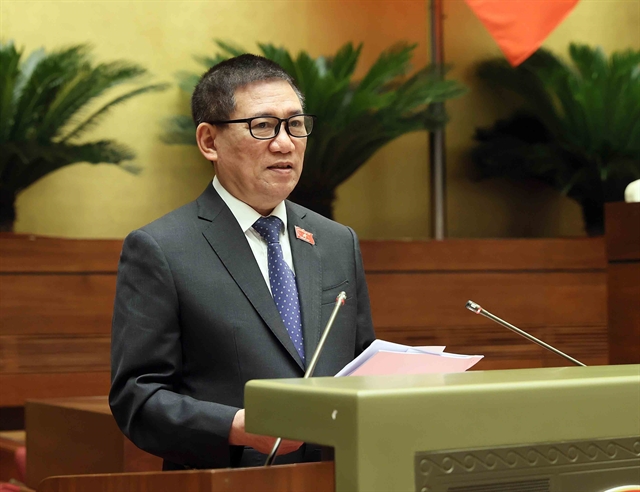 Opinion
Opinion

 |
| Minister of Finance Hồ Đức Phớc reports on the draft amended Law on Value Added Tax at the National Assembly meeting on Monday. — VNA/VNS Photo An Đăng |
HÀ NỘI — The National Assembly (NA)’s Finance and Budget Committee supports removing the value added tax (VAT) waiver for goods worth equal to or less than VNĐ1 million (US$39.30) imported via e-commerce platforms such as Shopee, Lazada and TikTok.
The committee’s report evaluating the draft amended Law on VAT pointed out that many countries have removed VAT waivers on low-value goods to increase budget revenue and create a fair competition environment for both domestically produced and imported products.
With the explosion of cross-border e-commerce, the volume of low-value goods imported via e-commerce platforms has gone up recently, committee Chairman Lê Quang Mạnh said at the NA meeting on Monday afternoon.
An average estimated 4-5 million low-value orders are transported from China to Việt Nam via e-commerce platforms such as Shopee, Lazada, Tiki and TikTok each day, he said.
The report noted that up to around $63 million worth of low-value goods are imported via e-commerce platforms per day, adding up to $1.9 billion per month.
Mạnh said that it is necessary to develop appropriate VAT policies to increase budget revenue as well as ensure fair competition between imported and domestically produced products.
With regard to a proposed increase of VAT on fertilisers, fishing vessels and agricultural machinery from zero to 5 per cent, Mạnh said that opinions remained divided over worries that the VAT increase might push up input costs of agricultural production, urging careful consideration of potential impacts on domestic production and farmers.
Mạnh also said that the common VAT rate of 10 per cent remains lower than in other countries in the world, meaning there is significant room to increase VAT in Việt Nam.
The report pointed out that the average VAT rate is 12 per cent in Asia, 14 per cent in Latin America, 16 per cent in Africa, 19 per cent among Organisation for Economic Cooperation and Development countries, 22 per cent in the European Union and 15 per cent overall globally.
Some ASEAN countries are raising their VAT rate as a solution to increase budget revenue after the COVID-19 pandemic. Việt Nam's strategy for tax system reform by 2030 also plans to increase VAT.
Mạnh said increasing VAT can be seriously considered with a proper roadmap, possibly after the economy recovers during the 2026-30 period.
As for Việt Nam’s products exported to foreign countries via digital platforms, the zero tax rate should be applied to encourage exports, he said.
Reporting on the draft amended Law on VAT, Minister of Finance Hồ Đức Phớc said that it’s necessary to pass the amended law as the existing one failed to cover all categories of goods properly.
The draft amended Law on VAT comprises four chapters and 18 articles aiming to improve the VAT policy framework, expand the tax base, ensure transparency and enhance tax management.
It focuses on improving regulations on products subject to VAT exemptions, the method of calculating VAT, VAT rates, input VAT deductions and VAT refunds. — VNS




